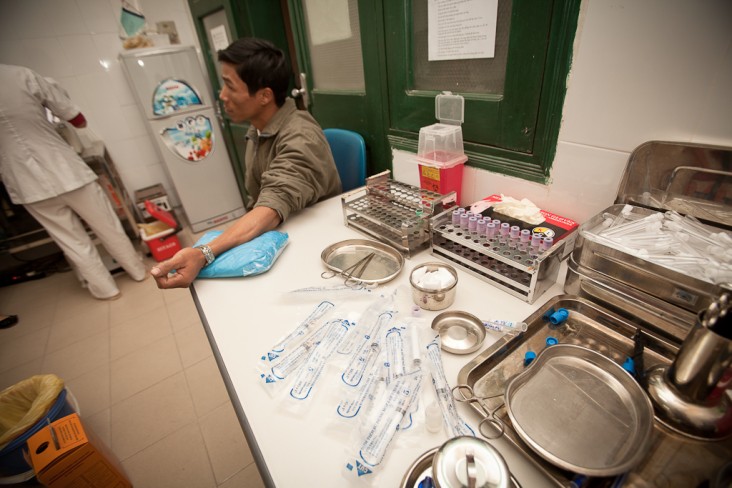Speeches Shim

August 2015—When Hieu Trinh Thi married five years ago, she knew that her husband Truong might be HIV positive since he had been an intravenous drug user in the past. In Hai Phong, Vietnam, where the couple lives, 44 percent of people who inject drugs are infected with the virus.
Hieu knew too that she was at risk of contracting HIV from Truong, if she hadn’t already. But the abstract idea of the virus didn’t outweigh her love for the motorbike taxi driver, and the couple wed in the fall of 2010.
It wasn’t until the following year when Hieu discovered she was pregnant that the meaningfulness of the risk began to dawn on her. The health of her unborn child was at stake. Might her baby be infected with the virus? Hieu was distraught. She didn’t know what to do or who to turn to for help—until Van Nguyen, the wife of her husband’s friend, reached out.
Nguyen, who is living with HIV, is part of a network of peer educators working to link individuals with services. In Hai Phong, 32 peer educators referred 6,321 people for HIV testing between May 2014 and April 2015.
Nguyen urged Hieu to visit a nearby HIV clinic for testing and counseling. At a local clinic in Hai Phong, Hieu tested positive for HIV, received counseling, and was referred to antiretroviral therapy. At the clinic, Hieu was also enrolled in the Access to Care Information System (ACIS), an open-source, SMS-based platform that provides automated referral tracking between HIV testing, and care and treatment services.
Nga Thi Dang is a counselor at the Le Chan clinic, who has been working with ACIS since its inception in November 2013. Before ACIS, she explained, there was no way for service providers to know whether their clients received follow-up treatment at outpatient clinics. Many clients who were tested and counseled never took the next step of enrolling in treatment. With ACIS, automated tracking informs referring clinics when a patient has enrolled in outpatient care. If a client doesn’t visit an outpatient clinic within four weeks of being referred, counselors like Dang call them to follow up.
In 2014, 174 of Hai Phong’s 230 HIV-positive clients, or more than 75 percent, successfully enrolled in outpatient care within three weeks of referral. Nationally, only 37 percent of those diagnosed with HIV were registered at HIV care and treatment facilities in the country in 2013.
“ACIS fills the gap between the HTC [HIV testing and counseling clinic] and OPC [outpatient clinic],” Dang explained. “It’s time-efficient and effective for both service providers and clients.”
USAID’s Sustainable Management of the HIV/AIDS Response and Transition to Technical Assistance (SMART TA) program has supported the range of interventions from peer education to referral tracking, which can be lifesaving to individuals like Hieu. SMART TA trains peer educators like Nguyen and provides HIV testing and counseling services throughout Vietnam. The program helped Hai Phong and four other provinces start using ACIS in November 2013.
When Hieu arrived at the clinic with her friend Nguyen, distraught at the possibility that she might transmit HIV to her unborn child, counselors explained that with proper monitoring and treatment, the risk of mother-to-child infection risk can be as low as 2 percent. Hieu was immediately enrolled in antiretroviral treatment and, in 2011, she gave birth to a healthy, HIV-negative son. Today, she credits the treatment with giving her a new lease on life.
“I want [my son] to live a happy, normal life like all other children. And I’ll be there to watch him grow up.”
LINKS
Follow @USAIDVietnam, on Facebook, on Flickr, on YouTube

Comment
Make a general inquiry or suggest an improvement.